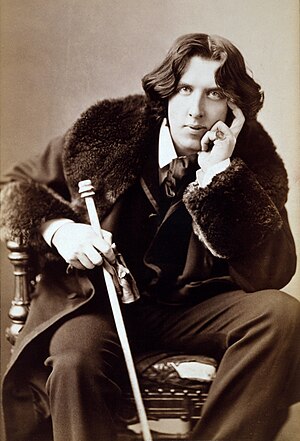
Society--civilized society, at least--is never very ready to believe anything to the detriment of those who are both rich and fascinating. It feels instinctively that manners are of more importance than morals, and, in its opinion, the highest respectability is of much less value than the possession of a good chef ... Even the cardinal virtues cannot atone for half-cold entrees...
Share this quote:
Man is many things, but he is not rational.
Share this quote:
It was the passions about whose origin we deceived ourselves that tyrannized most strongly over us.
Share this quote:
Human life--that appeared to him the one thing worth investigating. Compared to it there was nothing else of any value. It was true that as one watched life in its curious crucible of pain and pleasure, one could not wear over ones face a mask of glass, nor keep the sulphurous fumes from troubling the brain and making the imagination turbid with monstrous fancies and misshapen dreams.
Share this quote:
Im a man of simple tastes. Im always satisfied with the best.
Share this quote:
I dont want to earn my living, I want to live.
Share this quote:
An idea that is not dangerous is unworthy of being called an idea at all.
Share this quote:
Experience was of no ethical value. It was merely the name men gave to their mistakes. Moralists had, as a rule, regarded it as a mode of warning, had claimed for it a certain ethical efficacy in the formation of character, had praised it as something that taught us what to follow and showed us what to avoid. But there was no motive power in experience. It was as little of an active cause as conscience itself. All that it really demonstrated was that our future would be the same as our past, and that the sin we had done once, and with loathing, we would do many times, and with joy.
Share this quote:
He discovered wonderful stories, also, about jewels. In Alphonsos Clericalis Disciplina a serpent was mentioned with eyes of real jacinth, and in the romantic history of Alexander, the Conqueror of Emathia was said to have found in the vale of Jordan snakes with collars of real emeralds growing on their backs. There was a gem in the brain of the dragon, Philostratus told us, and by the exhibition of golden letters and a scarlet robe the monster could be thrown into a magical sleep and slain. According to the great alchemist, Pierre de Boniface, the diamond rendered a man invisible, and the agate of India made him eloquent. The cornelian appeased anger, and the hyacinth provoked sleep, and the amethyst drove away the fumes of wine. The garnet cast out demons, and the hydropicus deprived the moon of her color. The selenite waxed and waned with the moon, and the meloceus, that discovers thieves, could be affected only by the blood of kids. Leonardus Camillus had seen a white stone taken from the brain of a newly killed toad, that was a certain antidote against poison. The bezoar, that was found in the heart of the Arabian deer, was a charm that could cure the plague. In the nests of Arabian birds was the aspirates, that, according to Democritus, kept the wearer from any danger by fire.
Share this quote:
The difference between literature and journalism is that journalism is unreadable and literature is not read.
Share this quote:
I hate vulgar realism in literature. The man who would call a spade a spade should be compelled to use one.
Share this quote:
Literature always anticipates life. It doesnt copy it but moulds it to its purpose.
Share this quote:
To give an accurate description of what has never occurred is not merely the proper occupation of the historian, but the inalienable privilege of any man of parts and culture.
Share this quote:
I wrote when I did not know life;now that I know life, I have no more to say.
Share this quote:
Journalism is unreadable, and literature is unread.
Share this quote:
The truth is rarely pure and never simple. Modern life would be very tedious if it were either, and modern literature a complete impossibility.
Share this quote:
The difference between literature and journalism is that journalism is unreadable and literature is not read
Share this quote:
Yet one had ancestors in literature as well as in one’s own race, nearer perhaps in type and temperament, many of them, and certainly with an influence of which one was more absolutely conscious. There were times when it appeared to Dorian Gray that the whole of history was merely the record of his own life, not as he had lived in act and circumstance, but as his imagination had created it for him, as if it had been in his brain and in his passions. He felt that he had known them all, those strange terrible figures that had passed across the stage of the world and made sin so marvellous and evil so full of subtlety. It seemed to him that in some mysterious way their lives had been his own.
Share this quote:
The artist is the creator of beautiful things. To reveal art and conceal the artist is arts aim.The critic is he who can translate into another manner or a new material his impression of beautiful things. The highest as the lowest form of criticism is a mode of autobiography. Those who find ugly meanings in beautiful things are corrupt without being charming. This is a fault.
Share this quote:
Actions are the first tragedy in life, words are the second. Words are perhaps the worst. Words are merciless. . .
Share this quote: